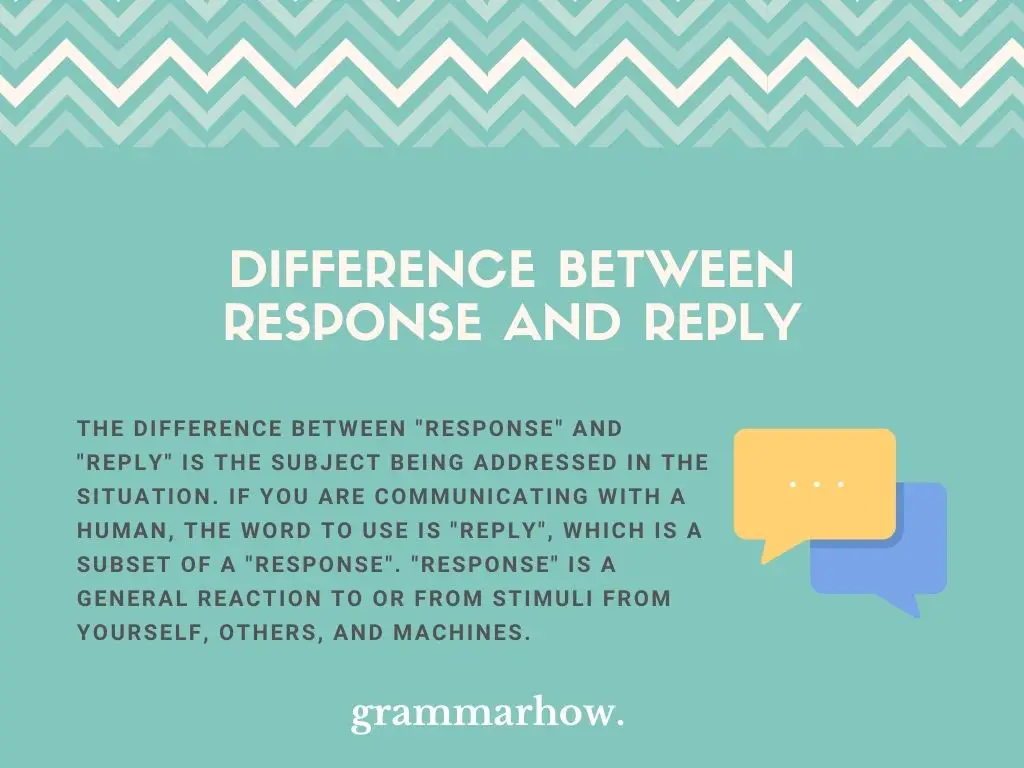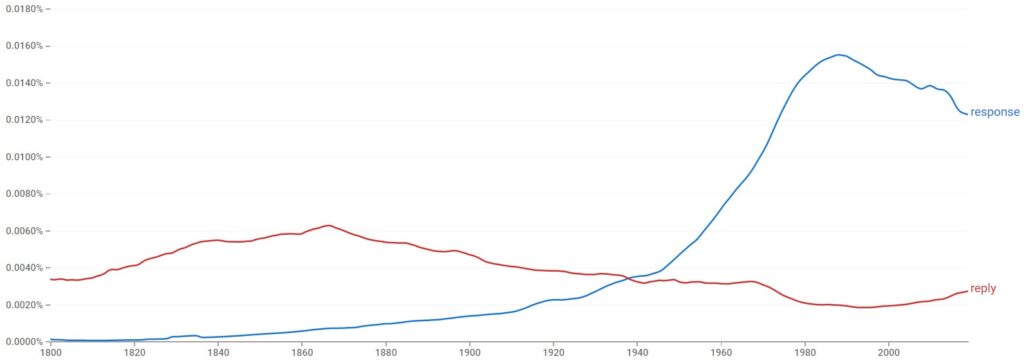When learning English, there are many nuances to words and one word can encompass the meaning of several other words. Learning the specific situations for these words can greatly improve your speaking and writing.
What Is The Difference Between Response And Reply?
The difference between “response” and “reply” is the subject being addressed in the situation. If you are communicating with a human, the word to use is “reply”, which is a subset of a “response”. “Response” is a general reaction to or from stimuli from yourself, others, and machines.

“Response” can be used in a wide array of situations, such as responding to how something feels, responding to what someone says, or receiving a response from a computer program. “Reply”, however, can only be used in response to a verbal interaction.
What Does “Response” Mean?
A “response” is a reaction to stimuli from a person or thing. It can be used casually or formally but is used frequently for formal documents and speeches. “Response” is used to indicate a wide array of reactions to different stimuli.
You can have a response to a physical sensation, to a letter from someone, an interaction with an animal, and a response can even come from different machines when given commands. “Response” is defined by the Cambridge Dictionary as “something said or done as a reaction to something that has been said or done; an answer or reaction”.
Below are a few examples of how “response” can be used correctly in a sentence for you to reference on its usage.
- The printer made 20 copies in response to my command.
- I scratched my arm in response to an itch.
- They sent a response to my email after three days.
- They started eating better in response to advice from their doctor.
- He ignored him as a response rather than texting him back.
What Does “Reply” Mean?
A “reply” is a specific subset of a “response”, specifically a response to outside human stimuli. The reason a “reply” is specifically a response to human stimuli is due to the nature of the communication. You can “reply” to a written or verbal communication from someone.
As defined by the Cambridge Dictionary, a “reply” is “to react to something that someone has done“. You cannot “reply” to stimuli generated by your own body, such as a physical sensation.
A machine cannot “reply” to you because it can only “respond” to the commands you have generated. You can “reply” to your pet, but your pet can only “respond” due to the language barrier.
Here are some good examples of how “reply” can be used correctly as a response in a sentence.
- Why didn’t you reply to my text?
- She forgot to reply to his question.
- They sent their penpal a reply to their latest letter.
- He didn’t bother to reply to his brother for hours.
- She sent me a reply asking me to pick up a few more items from the store while I was there.
Can “Response” And “Reply” Be Used Interchangeably?
When using “reply”, you can substitute it with “response” because “response” is a universal reaction to stimuli. You cannot always substitute “response” with “reply” however, due to the fact that a “reply” is only in response to human interactions and stimuli.
The reason you cannot always substitute the word “response” with the word “reply” is because it is not always a human interaction which generated the stimuli. As a result, it is not fitting if you were to “reply” to your computer or “reply” to an itch.
You can substitute the word “reply” with “response” in any situation. This is specifically because a “reply” is a subset for a “response”. This allows you to “respond” to a letter or to “respond” to something someone said or did.
Is It “Thank You For Your Response” Or “Thank You For Your Reply” On Email?
When replying to an email, you can use either “thank you for your response” or “thank you for your reply”. If you would like to be more formal, use “thank you for your response”. If you are speaking casually, use “thank you for your reply”.
If you are responding to a previous email for something professional, work-related, or formal, it is best to use “thank you for your response”, as it sounds much more formal, polite, and professional.
If you are more friendly with the person responding to your email or it is for something less formal or professional, you can use the phrase “thank you for your reply” as it is more casual and natural. You may still use “thank you for your response” if you wish.
Here are some examples on how you can use these two phrases in emails.
- Thank you for your response to my inquiry.
- Thank you for your reply to my RSVP.
- Thank you for your response as your input is appreciated.
- Thank you for your reply filled with cute animals.
Is “Response” Or “Reply” Used The Most?
When it comes to the preferred usage of “response” or “reply”, it is shown that people use “response” much more often than “reply”. This can be seen in this Google Ngram Viewer which shows a comparison of the usage of both words over time.

As you can see in the available graph, “response” has always been the preferred word choice. “Reply” has seen steady usage over the years, though it does not compare to the usage of “response” by the people.
Does “Answer” Mean The Same As “Response” And “Reply”?
“Answer” does not mean the same as “response” or “reply”. It is another specific subset for a “response”, as an answer is specifically in regards to solving a problem presented by stimuli. This could be from a wide array of stimuli and not specifically from human interactions.
You can use “answer” when you are providing a solution or for a problem, question, or issue caused by the stimuli. This stimuli can be from electronics, questions from peers, or problems in your daily life.

Martin holds a Master’s degree in Finance and International Business. He has six years of experience in professional communication with clients, executives, and colleagues. Furthermore, he has teaching experience from Aarhus University. Martin has been featured as an expert in communication and teaching on Forbes and Shopify. Read more about Martin here.
